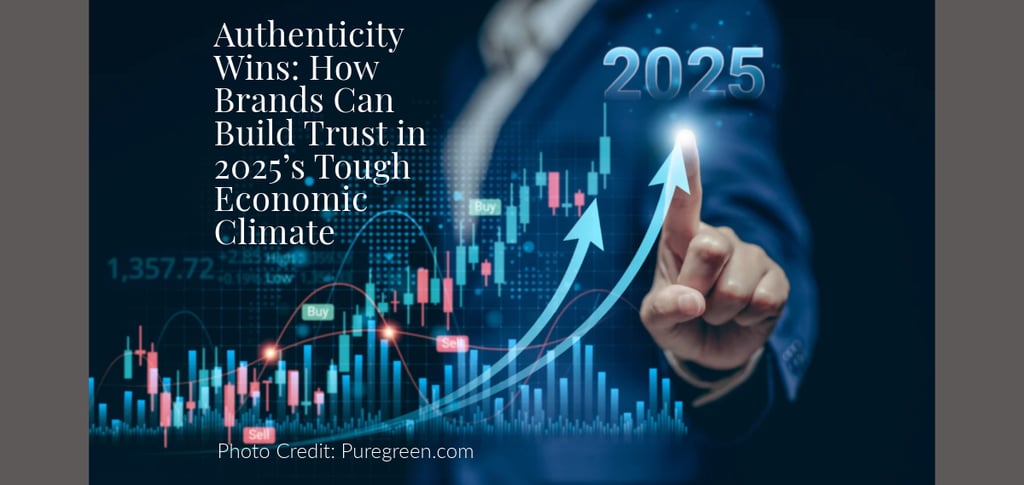Authenticity Wins: How Brands Can Build Trust in 2025’s Tough Economic Climate
4/17/2025


Authenticity Wins: How Brands Can Build Trust in 2025’s Tough Economic Climate
In 2025, authenticity isn’t just a marketing buzzword—it’s the key to survival. With inflation squeezing wallets, U.S. tariffs sparking global trade tensions, and consumer trust at historic lows, brands must forge genuine connections to stay relevant. The World Happiness Report’s 2025 findings, showing the U.S. plummeting to No. 24 in global happiness, reveal a skeptical, disconnected populace, especially among youth. Add to that Edelman’s Trust Barometer, noting only 43% of Americans trust brands, and it’s clear: cultural fluency and authenticity are critical to winning hearts and wallets. Drawing on Deloitte’s marketing insights, McKinsey’s consumer trends, and posts on X, this post explores how brands can navigate the economic storm, build trust, and thrive through genuine engagement.
The Economic Context: A Perfect Storm
The global economy is shaky in 2025. U.S. tariffs—10% on most imports, up to 54% on China—have spiked consumer prices by $1,300 per household, per the Tax Foundation. Core inflation sits at 3.5%, eroding purchasing power, while J.P. Morgan warns of a 60% global recession risk. Retaliatory tariffs from the EU, Canada, and China disrupt supply chains, hitting small businesses and luxury brands hard. In the U.S., youth unhappiness (ranked 62nd globally, per Gallup) fuels distrust in institutions, with Gen Z and Millennials demanding value, transparency, and social good.
Consumers are savvy, skeptical, and strapped. They’re turning to social media to call out inauthentic brands, with 70% prioritizing trust over price, per Deloitte. Cultural fluency—understanding local, generational, and economic nuances—is now a make-or-break skill for brands aiming to connect.
Strategies for Authentic Branding
To build trust and relevance, brands must blend authenticity with economic sensitivity and cultural savvy. Here’s how they’re doing it in 2025:
1. Transparency Builds Trust
Economic pressures demand honesty. Brands that openly address pricing, supply chain woes, or tariff impacts earn loyalty.
Case Study: Patagonia’s 2025 “Tariff Truth” campaign explains how import duties raise costs but pledges to absorb 50% of increases, keeping prices stable. Shared on X, it’s resonated with 68% of consumers who value transparency, per Deloitte.
Tactic: Use platforms like TikTok to break down costs or highlight budget-friendly options. Walmart’s “Inflation Fighter” bundles, promoted via short-form videos, have boosted sales 12% by catering to cash-strapped shoppers.
2. Cultural Fluency Connects Generations
Gen Z, grappling with economic and social disconnection, craves brands that reflect their struggles, diversity, and values like sustainability.
Case Study: Nike’s “Real Voices” campaign, launched in 2025, features Gen Z creators from underserved communities sharing stories of resilience. By amplifying authentic voices on Instagram, Nike saw a 15% engagement spike among 18–24-year-olds, per Sprout Social.
Tactic: Partner with micro-influencers who embody local or cultural authenticity. Avoid tokenism—73% of consumers reject brands that “perform” diversity without action, per McKinsey.
3. Purpose-Driven Engagement
Consumers want brands to tackle real issues, from affordability to climate change, especially in tough times.
Case Study: Unilever’s 2025 “Affordable Essentials” initiative donates 10% of profits from low-cost products to food banks, addressing economic hardship. Promoted on X, it’s lifted brand trust by 20%, per Edelman.
Tactic: Align with causes that match your brand’s DNA. TOMS’ pivot to mental health grants, supporting disconnected youth, resonates with 80% of consumers who prefer socially responsible brands, per Nielsen.
4. Hyper-Personalization via AI
AI lets brands tailor experiences, but authenticity hinges on respecting privacy and avoiding overreach.
Case Study: Spotify’s 2025 “Your Sound, Your Story” campaign uses AI to curate playlists based on users’ cultural and emotional contexts, shared via personalized Instagram Stories. It’s driven a 10% subscription boost while emphasizing data consent.
Tactic: Use AI for relevant, opt-in personalization, like location-based offers, but be transparent about data use—60% of consumers distrust brands with murky practices, per PwC.
Economic Tie-Ins: Why Authenticity Matters Now
The economic climate amplifies the need for trust. Tariffs and inflation make consumers choosier, favoring brands that offer value without gimmicks. Small businesses, hit by supply chain disruptions, lean on local authenticity to compete with giants. Luxury brands, facing EU retaliatory tariffs, pivot to storytelling about craftsmanship to justify prices. Meanwhile, declining youth happiness drives demand for brands that feel empathetic, not exploitative. Posts on X highlight a surge in “anti-corporate” sentiment, with consumers rallying behind brands that prioritize people over profits.
Pitfalls to Avoid
Inauthenticity is a death knell. Greenwashing—claiming sustainability without proof—backfires, as seen when H&M’s 2024 eco-campaign was debunked, tanking trust by 25%, per Edelman. Cultural missteps, like Pepsi’s tone-deaf 2017 ad, live on in social media infamy. Overusing AI without human touch feels robotic—consumers crave real stories, not algorithms. Brands must also avoid “virtue signaling”; Gen Z, especially, smells inauthenticity a mile away.
A Critical Perspective
Authenticity sounds simple but is fiendishly hard. Economic pressures tempt brands to cut corners, like slapping “sustainable” on products without proof. Cultural fluency requires deep investment in diverse teams and local insights, which many firms skimp on—McKinsey finds 40% of brands lack diverse leadership, undermining credibility. The trust deficit, worsened by economic and social disconnection, means one misstep can torch years of goodwill. Yet, brands that nail authenticity—like Patagonia or Nike—see loyalty soar, proving it’s worth the effort. The economic crunch makes genuine connection not just strategic but existential.
The Path to Trust in 2025
In 2025, authenticity is a brand’s currency. By embracing transparency, cultural fluency, purpose, and smart AI, brands can build trust in a skeptical, economically strained world. The stakes are high: connect genuinely, and you’ll thrive; misstep, and you’re canceled. As consumers demand more from brands, the winners will be those who listen, adapt, and deliver real value.
Thought-Provoking Questions:
Can brands balance affordability and authenticity without compromising quality in this economic crunch?
How will Gen Z’s distrust shape the future of brand loyalty as economic pressures mount?
Could overreliance on AI personalization erode the human touch that consumers crave?
hello@boncopia.com
+13286036419
© 2025. All rights reserved.